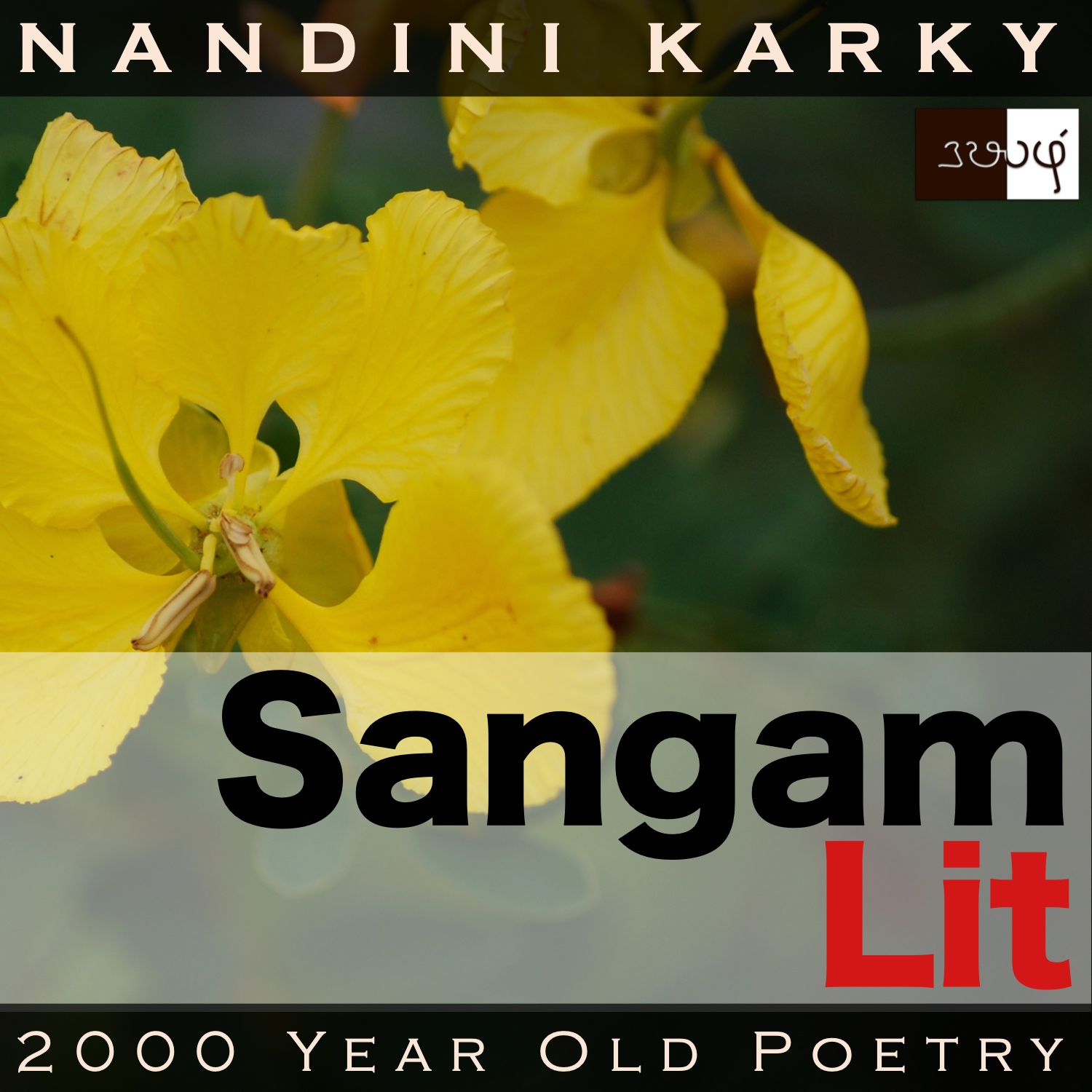Podcast: Play in new window | Download
Subscribe: Apple Podcasts | Spotify | Amazon Music | Android | iHeartRadio | Email | TuneIn | RSS | More

In this episode, we relish the journey of seasons and sensations, depicted in Sangam Literary work, Natrinai 86, written by Nakkirar. Set in the ‘Paalai’ landscape, the poem speaks in the jubilant voice of the confidante to the lady, conveying the news of the man’s return.
அறவர், வாழி-தோழி! மறவர்
வேல் என விரிந்த கதுப்பின் தோல
பாண்டில் ஒப்பின் பகன்றை மலரும்
கடும் பனி அற்சிரம், நடுங்க, காண்தகக்
கை வல் வினைவன் தையுபு சொரிந்த
சுரிதக உருவின ஆகிப் பெரிய
கோங்கம் குவி முகை அவிழ, ஈங்கை
நல் தளிர் நயவர நுடங்கும்
முற்றா வேனில் முன்னி வந்தோரே!
A terse little verse, packed with rhythmic elements like ‘அறவர் – மறவர்’, ‘சொரிந்த – சுரிதக’, ‘கோங்கம் – ஈங்கை’, ‘நல்தளிர்- நயவர’ and ‘கோங்கம் – நுடங்கும்’. Learnt that the word ‘பாண்டில்’ refers to a type of ‘hand lamp’ with a stick-like base and a bowl-like top on which the wick is lit. This poem is a visual treat, blooming with not just one but two different flowers – ‘பகன்றை’ or the ‘rattlepod’ and the ‘கோங்கம்’ or the ‘buttercup’. There is mention of a ‘கை வல் வினைவன்’ meaning ‘one who is skilled with his hands’, perhaps a ‘smith’. Speaking of skilled smiths, let’s move on to relish the creation of this wordsmith!
The man has left the lady to complete a task, with the promise that he will be back before the end of spring. Seeing him return, the confidante runs to the lady and says, “Long may your man live! With a shape like a soldier’s spearhead, a silky, hairy skin and looking like a hand lamp, bloomed the ‘pakandrai’ flowers in late autumn. Just then, he went away and left you trembling. Now, in spring, like a golden head ornament carved by a skilled smith, blooms the big bud of the ‘kongam’ flower and the young sprouts of the ‘eengai’ tree dance in the breeze. He has already returned before the promised time. Indeed, he is a man of virtue!” With these words, the confidante brings back cheer to the pining lady and celebrates the man who has kept his word and returned on time.
Delving deeper, we unravel the intricate beauty of this little work. First, is the detailed description of the ‘pakandrai’ flower or the ‘rattlepod’. Two similes paint the hues of this flower. One is the comparison with a soldier’s spearhead. Looking at the picture of this flower, I saw that it was looking exactly like the symbol of spade in a card set. Well, fortunate that cards are the only battle weapons we are conversant with! An acute skill of observation and connection in this poet can be detected in equating the flower to the seat of a soldier’s power, his spearhead. The second comparison is to how the stalk and the flower look, by equating it to a ‘pandil’, an ancient hand lamp with a stick-like base and a blooming bowl on which the the flame rises like the ‘pakandrai’ flower’s petal. All this description of the flower is just to say that it blooms when winter is fast approaching, in the cold season of late autumn called as ‘mun pani’, spanning the months between November and January. Right says the flowering calendar of the rattlepod, which is said to bloom in November. With a flower’s bloom, the time of a lady’s fade is revealed!
From that past moment of last autumn, the confidante then talks about their present, which is the season of spring. A time when all life seems to be waking up from winter’s slumber. She talks about the blooming, big buttercups, which she sketches for us with a simile to a kind of head ornament, perhaps like an elaborate tiara or a crown, which has been crafted by a skilled goldsmith. With their splash of gold, buttercups do seem like nature’s crowns in the spring. Not just the buttercups, we also have the ‘eengai’ or the ‘twisted acacia’ budding into sprouts too. All this is said to happen between the months of February and April, which coincides with the spring or the ‘Ila venil’. The confidante says that the man has returned in the promised time. Just like springtime flowers, the lady’s pallor will disappear and good health will bloom, implies the confidante. A skilful metaphor to induce joy and confidence in the lady.
A man has kept his word. He is back when he promised he would be. Instead of brushing it away as something insignificant, here the confidante celebrates it! She showers praise on the man for just doing what he said he would. And yet, we sense the joy and positivity that spreads, like the sight of a flower at the end of winter’s long night. Perhaps, a cue for us to focus on and celebrate those tiny, taken-for-granted, positive events that bloom in our lives!




Share your thoughts...